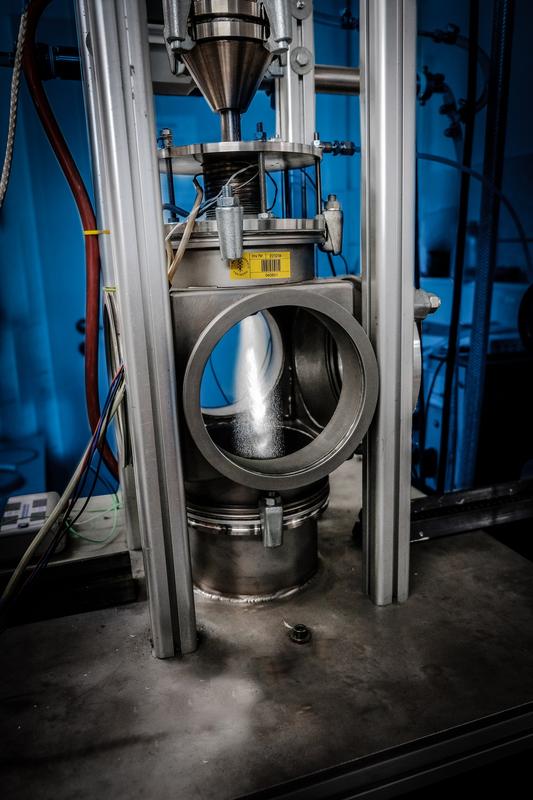TU Freiberg develops new process for natural-based microparticles in cosmetics

Atomization of a liquid jet. Mario Köhler / TU Bergakademie Freiberg
In the next years, the Chair of Fluid Mechanics and Turbomachinery at the TU Bergakademie Freiberg wants to develop together with scientists of the Johannes-Gutenberg-University Mainz and the TU Munich as well as three industrial partners an innovative atomization process for bio-based, biodegradable polymer materials.
These environmentally friendly microparticles shall replace environmentally harmful microplastics in shampoos and other cosmetics.
The Bioshampoo project examines the complete process chain from conception of the process, particle development, integration into a final product (shampoo), and final biodegradability testing after initiation into the water cycle.
“Microplastics” consists of plastic particles with a size of a few nanometers to a few millimeters. Petroleum-based microplastics is currently contained in many cosmetic products. In sewage treatment plants, these very small particles are difficult to break down or filter off.
In the new atomization process, the feed material obtained from natural substances is first melted and then the melt is forced through a nozzle via a high speed gas flow.
The melt decays into individual droplets, which form predominantly spherical particles after solidification. These are supposed to perform the same function as microplastics in cosmetics, but the participating scientists expect that the nature-based microparticles can be removed much easier and faster from the wastewater.
The project is funded under the Central Innovation Program for Small and Medium-sized Enterprises (ZIM) with a total of approxemately 1.1 million Euros. In the project application and implementation, the scientists were and are supported by the innoscripta GmbH Munich.
Prof. Dr.-Ing. habil. Rüdiger Schwarze, Phone: +49 (0)3731 39 2486, email: Ruediger.Schwarze@imfd.tu-freiberg.de
Media Contact
More Information:
http://www.tu-freiberg.de/All latest news from the category: Life Sciences and Chemistry
Articles and reports from the Life Sciences and chemistry area deal with applied and basic research into modern biology, chemistry and human medicine.
Valuable information can be found on a range of life sciences fields including bacteriology, biochemistry, bionics, bioinformatics, biophysics, biotechnology, genetics, geobotany, human biology, marine biology, microbiology, molecular biology, cellular biology, zoology, bioinorganic chemistry, microchemistry and environmental chemistry.
Newest articles

First-of-its-kind study uses remote sensing to monitor plastic debris in rivers and lakes
Remote sensing creates a cost-effective solution to monitoring plastic pollution. A first-of-its-kind study from researchers at the University of Minnesota Twin Cities shows how remote sensing can help monitor and…

Laser-based artificial neuron mimics nerve cell functions at lightning speed
With a processing speed a billion times faster than nature, chip-based laser neuron could help advance AI tasks such as pattern recognition and sequence prediction. Researchers have developed a laser-based…

Optimising the processing of plastic waste
Just one look in the yellow bin reveals a colourful jumble of different types of plastic. However, the purer and more uniform plastic waste is, the easier it is to…



